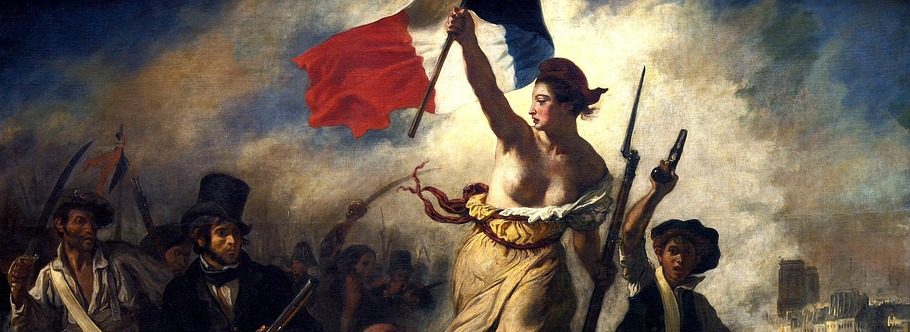We are approaching the International Congress of Historians in Poznań, which will take place from 21 to 29 August 2022 and during which our Commission Internationale d'Histoire de la Révolution française will also hold several events. Last but not least, the General Assembly, which traditionally also serves to elect a new Board, will take place during the congress.
In order to prepare for this election, Pierre Serna, until now Vice-President of the Commission and candidate for the election to the Presidency in the next period 2022-26, has formulated some thoughts on the direction of the Commission's work, which we publish below (in French). Hopefully, they will stimulate further proposals and a discussion among the members of the Commission as well as in the wider circle of those interested in the work of the Commission.
If you would like to participate or receive information about the Commission's events in Poznań, please send an email to middell [at] uni-leipzig.de.
Proposition pour une poursuite et un renouvellement des activités de la CIHRF
Avec les deux années de crise pandémique (une autre façon de vivre la mondialité), de nouveaux enjeux se posent à notre commission internationale d’histoire de la Révolution française, au moment de renouveler sa présidence, son bureau et le conseil, lors du congrès de Poznan en Pologne à la fin du mois d’aout 2022.
Il me semble que les enjeux sont ceux de l’adaptation de notre commission et de son riche héritage aux conditions nouvelles d’exercice de la recherche.
Je propose dans un premier temps un renouvellement du conseil en tenant compte de façon encore plus soutenue du cosmopolitisme des études sur la Révolution et en ouvrant notre conseil à des membres appartenant à des différentes générations venant d’espaces qui jusque-là n’étaient pas représentés, et veillant de plus, à toujours davantage de parité.
Il faudrait également profiter des leçons de la crise sanitaire pour aller dans trois nouvelles directions. Le renouvellement des générations, et nous ne pouvons que nous en réjouir, est en marche. La dynamique pour les études révolutionnaires demeure forte, toute en s’ouvrant à de nouveaux objets des recherches actuelles : historie du genre, histoire des émotions, histoire transnationale, histoire des colonisations et des décolonisations, histoire des transferts culturels, histoire des conflits, nouvelle histoire des Révolutions et de leur chronologie, entre autres.
Ce constat permet d’envisager deux initiatives que je souhaiterais mettre en place.
1) Proposer la création au sein de la CIHRF d’une commission de doctorants qui se réunirait une fois par an pour un séminaire à distance pour établir l’avancée des recherches et de leur progression. Cela permettrait de constituer un réseau de doctorants se connaissant et pouvant s’entraider et partager leurs méthodes et savoirs.
2) La recherche actuelle ne permet plus d’envisager la vie dynamique d’une association avec un congrès une fois tous les 5 ans ou avec un colloque intermédiaire à Vizille.
Dans ces conditions, il faudrait imaginer de façon souple, un séminaire annuel de notre commission sur un thème choisi par le bureau en partenariat avec la commission des doctorants qui pourraient s’organiser à tour de rôle dans un continent différent. Evidemment, tous les membres ne pourraient y participer mais cela permettrait de créer des dynamiques régionales, et de les adapter des formes hybrides d’échanges aussi.
Avec quels moyens ? La question légitime s’impose de suite.
Il me semble qu’un des objectifs de la nouvelle dynamique à imprimer à la CIHRF est de tenter d’intégrer ses activités à nos activités de laboratoire, department ou institut, ou même d’association régionale et de réseau de recherche d’après les conditions locales. C’est je crois d’ailleurs la seule solution pour rendre visibles et régulières nos activités. Ainsi si nous organisons avec nos institutions respectives un séminaire une journée d’études, un colloque sur la RF, ou sur les Révolutions, et que nous pensons systématiquement intégrer la CIHRF, ne serait-ce que dans les logos des institutions organisatrices, il y aurait là une possibilité de rendre plus visibles nos initiatives intégrées de façon plus naturelle dans la vie de nos laboratoire.
3) Pour réussir cette proposition, il me semble qu’il faut aussi, au regard la recherche internationale, accepter d’ouvrir nos problématiques, de façon plus affirmée, vers toutes les Révolutions du monde entre 1750 et les 1840s, cela permettrait de nous trouver plus en phase avec les recherches actuelles et surement d’attirer d’autres chercheurs dans notre dynamique. Les révolutions dans l’Atlantique et surtout l’Amérique du Sud pourraient intégrer nos préoccupations. Les transformations dans l’Océan Indien, les changements en Afrique, la chronologie des révolutions européennes élargie, permettrait d’ouvrir nos horizons d’attente et d’attirer plus de chercheurs vers notre commission.
4) Evidemment notre lien fort avec le musée de Vizille, qui est le siège administratif de notre commission, et la personne qui va succéder à Alain Chevalier qui nous a tant aidés ces dernières années, est un autre point important dans les tâches à accomplir du prochain bureau.
Je reste ouvert à toute autre proposition pour améliorer la vie de la Commission internationale d’histoire de la Révolution française.
Pierre Serna, professeur, vice-président de la CIHRF.
